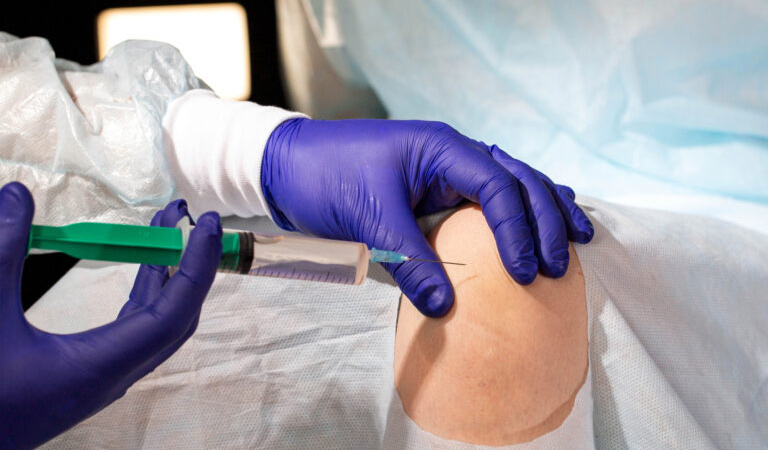
Knee pain can be debilitating and, for many, injections can quickly reduce pain and swelling and improve mobility and function. Are injections the right choice for you?
Types of Injections for Knee Pain
Cortisone Injections
Typically Cortisone injections are recommended for patients with knee arthritis when they are suffering from pain and swelling. They can be very effective for knee pain and osteoarthritis symptoms. The injection can quickly relieve these symptoms, usually within 1-3 days. Symptom improvement and improvements in VAS (visual analogue scores), which measures pain numbers on a scale of 1-10, typically improve even more significantly within the first 6 weeks after these injections, but may tend to decline around the 12 week mark post injection.
These injections can be given as frequently as every 3 to 4 months, if symptoms recur. However, we typically recommend waiting until pain/swelling symptoms have returned. Prophylactic injections and more frequent administration of the cortisone injections tends to lead to their becoming less effective over time and won’t end up working as well.
Gel Injections
You may have also heard of “Gel” injections. These are viscoelastic supplement injections that are a derivative of hyaluronic acid, which is a naturally occurring chemical in the normal synovial (joint) fluid.
In the arthritic knee, the amount of hyaluronic acid naturally diminishes. This substance typically binds to the chondral (cartilage) surface of the joint and helps to cushion the joint. With less of this and less cartilage in the knee, this leads to increased pain. The idea behind the Gel injections is that re-introduction of this substance will help cushion the joint surface and improve pain.
These injections are typically recommended as an alternative to cortisone injections and can be given every 6 months or so. Medicare covers them every 6 months, and various insurance companies cover them at different intervals. These are typically not given the same day as cortisone injections, but instead can be spaced out a few weeks afterwards to try to help prolong the effects.
Which Type of Knee Injection is Right for Me?
The cortisone injections tend to work better for patients with severe pain and acute swelling as they take effect quickly.
The gel injections do not take effect as quickly and can take 4-6 weeks to have their full effect, therefore I recommend providing them when the patient is suffering more from dull, achy pain and not acute swelling. In those settings we will often provide a cortisone injection to decrease pain and swelling. If the symptoms are not fully relieved in 2-4 weeks with continued dull, achy pain, then a gel injection can be administered to try to prolong the effects. These injections can typically see a trend of improvement in decreased VAS scores beginning 4-6 weeks after injection and lasting for 3 to 6 months in some studies.
Knee Injections Side Effects
Side effects for both types of injections are relatively minimal. Patient’s can expect some initial soreness and pain at the injection site which should subside in 24-48 hrs. Patients with diabetes may note a temporary rise in blood sugar levels for 48-72 hrs after cortisone injections. With any injection, there is a small (<1%) risk of infection. With gel injections, there is a reported 5% risk of a “pseudo-sepsis” reaction where they can develop a red, hot swollen knee which mimics infection. This typically improves with ice and NSAIDs after infection is ruled out. Long term use of cortisone can be damaging on healthy cartilage, but the majority of patients who we recommend cortisone injections for are those who already have damaged cartilage, aka, arthritis.
The good news is that patients can almost always expect some sort of relief from at least one of these types of injections. The real question will be which one works best for them and how long do the effects last. Cortisone injections tend to work quickly, and provide relief, but this can be as short as a few weeks or as long as several months. The gel injections tend to be effective for about 50% of patients, but for those that it works well for those patients tend to see improvement in VAS scores for at least 4-6 months.
What if Knee Injections Don’t Work?
Knee replacement would be the last step in the treatment process for a patient with knee arthritis. However, this should only come after the patient has tried and failed with injections, bracing, NSAIDs, use of cane/walker, and most importantly a formal physical therapy program to maximize strength, motion, and weight loss, if necessary. When these treatments don’t work, or stop working, then the patient’s options are to live with their current symptoms, or to proceed with knee replacement.
Knee replacement is the only thing that changes what the x-ray looks like and truly gets rid of the arthritis. All of the other treatments control the symptoms. The knee replacement is an open surgery where the ends of the femur and tibia, where the damaged cartilage is, are removed and metal caps are placed on the ends of the bone with a polyethylene spacer in between. This becomes the new knee joint. Patients nowadays typically go home the same day and are walking, with assistance, the day of surgery. Physical therapy ensues and patients typically recover in about 3 months. Knee replacement is a beneficial operation in the right candidate with typically 85-90% excellent outcomes.

Dr. Mark Sando is an internationally recognized orthopaedic surgeon specializing in sports medicine, arthroscopy and injuries of the shoulder, knee and hip. He earned his medical degree from Case Western Reserve University School of Medicine and completed residency at the University of Maryland Medical Center and R Adams Cowley Shock Trauma Center. After residency, Dr. Sando went on to complete subspecialized training in Sports Medicine as a fellow at the prestigious Kerlan-Jobe Orthopaedic Clinic in Los Angeles, CA under the direction of Dr. Neal ElAttrache. He has worked with numerous college athletic programs and professional teams including the world champion Los Angeles Kings, Los Angeles Lakers, Los Angeles Dodgers, and Los Angeles Sparks. Dr. Sando has been with the Orthopaedic Medical Group of Tampa Bay since 2015. Full Bio




